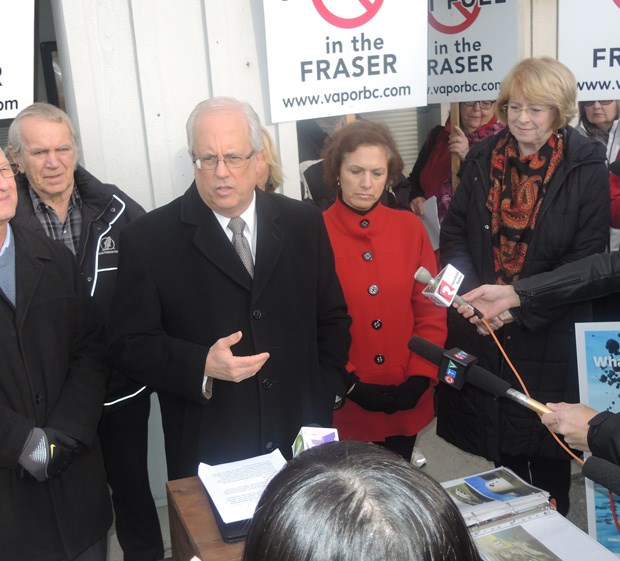The process that granted environmental approval to a jet fuel delivery plan to YVR is “flawed,” according to Richmond’s mayor, Malcolm Brodie.
Although wanting to sift through the 64-conditions attached to Environment Minister Mary Polak’s certificate before commenting in detail, Brodie left no doubt as to the city’s mind.
“We believe the BC Environmental Assessment Office (EAO) process was flawed,” Brodie said, two hours after Polak dropped the decision on an airline consortium’s plan to barge aviation fuel up the south arm of the Fraser River, off-load it on the banks of the river and then pipe it 15 kilometres across Richmond to YVR.
“Only one option was reviewed in the EAO process, even though there are many other options to address the airlines’ fuel needs.
“The community expects more than such a single-minded approach to an issue of this magnitude.”
The consortium — called VAFFC and made up of some of the major airlines that use YVR — attest that the current fuel supply, via tanker truck from Washington State and pipeline from a Burnaby refinery, is unreliable and not enough to meet future demands.
The City of Richmond, which has no power over the project, has opposed it in its current form from the outset three years ago.
And Brodie, while acknowledging the need for the airlines to have a reliable and adequate fuel delivery system, questioned some of the lofty predictions of spiking demand.
“The assumptions used to justify this project are questionable. This project is supposed to meet the needs of the airlines’ for the next 50 years,” he said.
“But no one can accurately predict the long-terms needs of the airline industry over that time frame. “What will the industry look like in 50 years? What fuels will be used? How much fuel capacity will be needed? The City of Richmond does not believe the current projections are realistic or that the project is actually required at this time.”
The project, added the mayor, is “certainly not required in the short term, which gives time to seek a workable solution, rather than rushing to proceed with this option now when so many questions remain unanswered.”
The city remains unconvinced by the B.C. government’s assessment that the environmental and safety risks for this project are low.
“There may be low probability of an incident occurring, but as has been seen in the Gulf of Mexico and elsewhere it only takes one major incident to happen and the impact to the environment and public safety could be catastrophic,” said Brodie.
“The City of Richmond remains prepared to work with the Vancouver Airport Fuel Facilities Corporation and other stakeholders to jointly seek a sustainable solution that is satisfactory to all parties and address economic, environmental and social concerns in a full, open process.”



